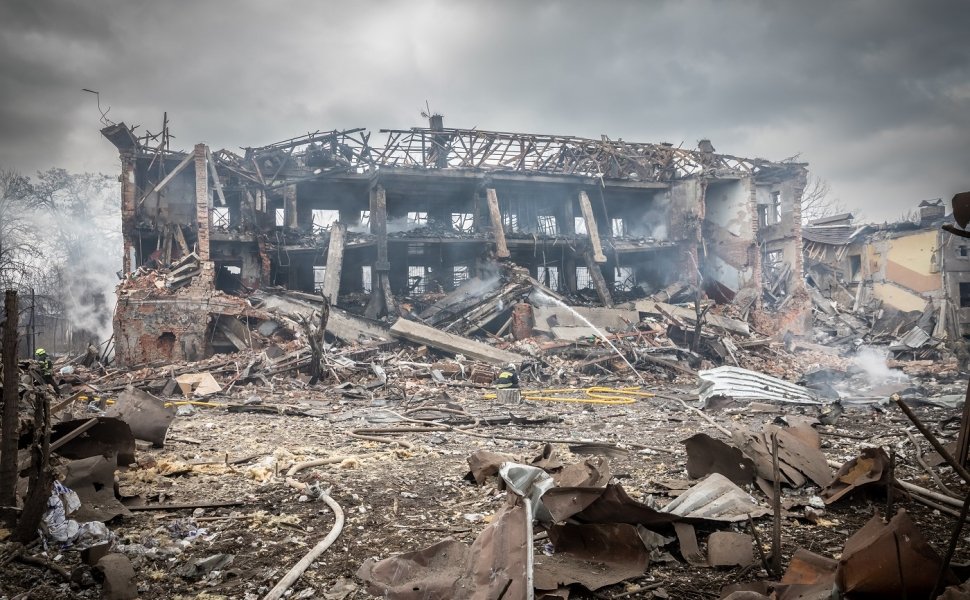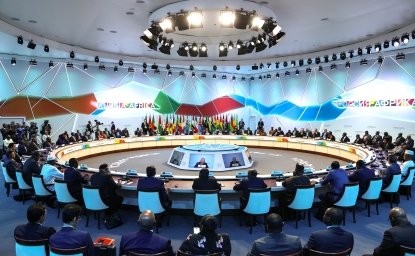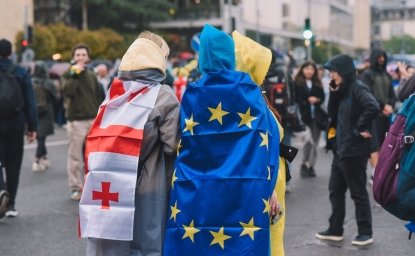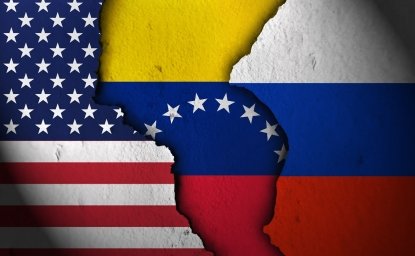- Part of The Russia File
- Podcast
Crumbling Memory: Russian Propaganda, World War II, and the Invasion of Ukraine

The war in Ukraine has highlighted Russian propaganda and the way it weaponizes the memory of World War II for political purposes—in this case, to justify Russia’s invasion of Ukraine. In this episode, Izabella Tabarovsky digs deep into Russia’s myths about the war and considers how the invasion of Ukraine is causing that entire symbolic universe to crumble. Guest: Dr. David Hoffmann. Commentators: Dr. Ivan Kurilla and Maxim Trudolyubov.
Show Notes:
- David Hoffmann, editor, The Memory of the Second World War in Soviet and Post-Soviet Russia. Routledge: 2022
- Izabella Tabarovsky, “Russia’s Lost War,” Wilson Quarterly, Fall 2020
- Svetlana Alexievich, The Unwomanly Face of War: An Oral History of Women in World War II. Random House: 2018
- A Wilson Center event: Victory Day Celebrations During Russia’s War of Aggression, May 9, 2022
Episode Transcript
-
Crumbling Memory: Russian Propaganda, World War II, and the Invasion of Ukraine
The transcript has been lightly edited for clarity.
Izabella Tabarovsky: Hello and welcome. I'm Izabella Tabarovsky, and this is The Russia File.
The war in Ukraine has shined a spotlight on Russian propaganda and the way it uses references to the Second World War to justify Russia’s aggression against Ukraine—the idea that Ukraine is being run by the Nazis; that Russian forces need to “denazify” Ukraine and remove its government; the notion that the Russian people have a duty to remember their sacred victory in World War II in order to rid the world of a resurgent Nazi plague. These ideas that President Putin used in his speech announcing the beginning of the invasion shocked and confused many in the West.
For long-term observers of the region, this was just the latest twist in a much longer story. Russian propaganda had been building up some of this rhetoric since Russia’s first invasion of Ukraine in 2014. But in many ways, its roots go back even further—to Soviet myths about the war and to the black-and-white, narrow, propagandistic meaning that Soviet propaganda assigned to the war and the Soviet victory in it.
On today’s program, we will dig deep into this history in order to understand how the Kremlin weaponizes Russia’s memory of World War II for political purposes—in this case, to justify a war of aggression.
We start with a conversation I had recently with David Hoffmann, professor of history at Ohio State University. David's latest book is The Memory of the Second World War in Soviet and Post-Soviet Russia. Welcome to the program, David.
***
Izabella Tabarovsky: I want to start with a question that you've written a lot about—on the political utility of war memory in Russia. How does the regime use the memory of war for its political purposes?
David Hoffmann: Thank you, Izabella. That's a very good question. The war was an enormous historical event. The victory in the war shaped world history and in addition, the Soviet people lost some 27 million killed in the war. So it's no surprise that the war is remembered. But that did not dictate how the war would be remembered or the fact that even today, 77 years after the end of the war, that war memory is still a central pillar of Russian national identity.
So here's where the political utility of war memory is very significant. It certainly is a way to try to galvanize patriotism in Russia. After the collapse of the Soviet Union, the collapse of communism left a large ideological void. And so Russia had something of a national identity crisis during the 1990s. Once Putin came to power in 2000, he really fixated on World War II memory as something that would fill that void, something that would give Russians a sense of their history, a sense of patriotism, and a sense of unity as well. So I think that's why there's this enormous political utility of war memory in Russia today.
Izabella Tabarovsky: It's interesting. In your book, you use a quote that I think Putin used a couple of years ago, where he said, “It is essential to pass on to future generations the memory of the fact that the Nazis were defeated first and foremost by the Soviet people.” And I think it's a quote that sounds particularly relevant today, because here's the Nazis that Putin talks a lot about or has talked a lot about in the run up to the invasion of Ukraine.
What is it about the image of the Nazis that is so mobilizing? It’s a strange reference. I think a lot of people in the West really didn't understand it. A lot of people are asking, “Why is it even effective? What a strange thing to say.” But I believe he says it because he knows that it's effective somehow domestically. So what makes it so effective?
David Hoffmann: That's a good question. Why is it 77 years after the end of the war that this fight against the Nazis still resonates with the Soviet people? I think it has to do with the fact that war commemoration was so pervasive for so many decades in the Soviet Union, and in Russia after the breakup of the Soviet Union.
If you look, for example, at what schoolchildren were taught. School textbooks from the 1940s all the way through the collapse of the Soviet Union in 1991 and even beyond in Russia today—all of these emphasized the war, the importance of the war, and they also portrayed the war in very much the same way. All the editions of textbooks had the same World War II periodization, the same stories, the same heroes. This sort of book learning was augmented by school museums, field trips to monuments, ceremonies to honor veterans.
The master narrative of the war was very strongly enforced. It was one that told of a fascist invader that was vanquished by the people's unity and the Red Army's heroism. And all suffering was attributed to the Nazis. There was no talk of leadership failures or popular panic. So this became a story of enormous sacrifice and unity in the face of a Western enemy. And the Nazis, of course, being that enemy: if Putin can today conjure up the specter of neo-Nazis in Ukraine, then it taps into all of these feelings that have been built up, as I said, for decades among the Russian people.
Izabella Tabarovsky: It's interesting also, even as you were talking, I've been thinking a lot about how the national narrative of World War II has this element of myth. So it has the heroes—the Soviet Army. It has obviously the evil of the Nazis. And the Soviet soldiers have to go on a hero's journey to bring back their holy grail of victory. There is the invocation of the ancestors, especially today, that for the sake of the great deed and heroism of our ancestors we have to go and repeat their deed. So I wonder if you ever thought about it from that perspective. That because it has this classic element of myth, that this is why it has such a powerful hold. There's something very ancient about the way we structure myths, and it's very much present in the story, in the national story of World War II.
David Hoffmann: Yes, that certainly is true. The myth of the war became a very compelling story to inspire patriotism, to inspire unity. The fact is, there was, of course, patriotism. There was unity. There was sacrifice. That’s not the entire story of the war; there are other elements as well. But that is what has become solidified as the myth of the war.
I mentioned before, the master narrative of the war is that all of the Red Army soldiers fought bravely. All of the people were willing to sacrifice. Clearly, this is something that's inspiring for future generations. That's, in fact, what Putin repeatedly harps on when he brings up the memory of the war, that this is going to inspire soldiers today to fight for the motherland and to defend the motherland. And we can get into this more, but he always portrays this war in Ukraine as a defensive war. Of course, it's not. It's a war of aggression by Russia. But the way that he presents it, it's a war to defend the motherland.
And as he said in his speech earlier this week on Victory Day, he said that it was a way to fight for “our people in Donbass.” Essentially referring to Russian-speaking Ukrainians as “our people,” regarding them as Russians instead of regarding them as Ukrainian citizens. So as you say, this myth is very powerful and one that can be mobilized for modern political purposes.
Izabella Tabarovsky: Exactly. And we see it happening in Russia's invasion of Ukraine today. Now, for that to happen, you already alluded to this. It's like there is a certain selectivity. He picks out—and Soviet leaders have picked out—certain elements of the war that serve their political purposes. They get weaponized currently, in the current conflict, in order to mobilize the population. But for that also to happen, certain stories need to be forgotten and omitted. And one of them is the story of women's service in the war and what happened to the memory of their contribution to the war.
David Hoffmann: Yes. This has been a topic of some of my own research. It's a little-known fact that some 800,000 women served in the Soviet military during World War II, including 120,000 in combat positions. So there were women who were snipers, who were bomber pilots, anti-aircraft gunners, and so forth. And yet after the war, this was almost entirely omitted from the official history of the war.
The master narrative of the war told only about male soldiers. They were the conquering heroes of the war. Women were instead relegated to traditional female roles. So, for example, you see at war memorials, often there were figures of women mourning their lost sons. The mother in mourning—this was a common image in Soviet war memorials, and women were also portrayed as nurses and sometimes as combat medics. But they were never portrayed as snipers or bomber pilots. They were not shown to have this active role in the fighting. And I think that that had to do with the fact that there was a real need to bolster masculinity in the wake of the war.
The overwhelming majority of the 27 million killed were men. In fact, 20.5 million out of that 27 million. So you had a huge loss of the male population as a result of the war. Many veterans, male veterans who did survive, were handicapped due to war injuries. So there was this potential for a crisis of masculinity and a real effort to sort of bolster masculinity after the war by portraying men as the brave soldiers and women in these, as I said, traditional female roles instead. So you're right, that's an important aspect of the war that was forgotten.
Izabella Tabarovsky: I think what's interesting is, as I think about my own memory, my memory of World War II…. Because I grew up in the Soviet Union. I was there until [age] 19, so I consumed all of that popular culture that was built around the war. Even in the ‘80s, there were war movies, old war movies, that people watched, that were really popular. Old war songs that people listened to and knew by heart.
I realized that the image of a woman that emerges from those films and from those songs, very often it's a woman who is waiting for her soldier. A wife or a girlfriend who is supposed to wait, who is supposed to be loyal and faithful, and how important it is for a soldier to know that she is there and maybe there's a baby and she's watching over the baby.
And I thought that that was very, very interesting. I had never questioned it until I started thinking about it, until I read….I think, first of all, what was a real revelation for me was Alexievich’s book, The War’s Unwomanly Face. And I realized it was the first time that I was reading the impressions and memories—authentic memories—of women who had experienced war. They were talking about experiences that I could relate to as a woman. And that was, as I said, it was truly a revelation.
David Hoffmann: Right, that's exactly what was left out of the master narrative of the war. In fact, many female veterans were told not to speak of their wartime service, that somehow this was unwomanly, unfeminine. There was also a real emphasis in the wake of World War II, even before, in fact, a real pro-natalist drive, a real emphasis on getting women to have more children.
And so the image of women, sort of what you were describing a minute ago, was always women as mothers, the mothers of future soldiers—not soldiers themselves. So that very much distorted what really happened. It was this particular and selective memory of World War II that left out the role that women played fighting in the war.
Izabella Tabarovsky: I thought that what was especially shocking was for me to learn about, and to read about, is how women…again, it's from Alexievich’s book, when they talk about how they came back from war and they were treated…men were treated as heroes and women were treated—it's as if they went there to have fun, to hang out with the guys.
And so they were told, “Well, don't talk about it. You'll never get married.” It was almost a shameful experience. And a lot of women talked about how the men who they fought with came back and they didn't want to have anything to do with them. They wanted to date women who had not been to war, women who represented that kind of feminine, soft feminine culture.
And of course, given the numbers after the war—I believe it was something like 650 men to 4,000 women—a lot of women were just left out. They were undesirable marriage partners and were just left alone. And God forbid they were injured. That left them completely… pushed…to the margins.
David Hoffmann: Right. It seems especially unjust, the fact that these women had fought and sacrificed and then they were almost tarnished by the fact that they had served in the military. They were seen as sexually loose, somehow undesirable as wives. And so [we have] this gendered memory of the war. And it did not have to be that way. In fact, if the Soviet government had really wanted to promote gender equality, this would have been a perfect opportunity to present women as comrades in arms who fought alongside men during the war. But instead, all of that was forgotten.
Izabella Tabarovsky: Another aspect that was, of course, completely left out in Soviet times was the genocide of the Jews, the Holocaust as it became known later. That word came in later. But Soviet memory of the war almost entirely excluded it, or instrumentalized it. Soviet propaganda used it for certain purposes here and there. They used it at Nuremberg. They used it in other aspects of propaganda, but as a whole, this is, again, something that I learned only after I came to the U.S. and started thinking back to…what did I know from those Soviet films about the genocide of the Jews in Soviet territories? And I knew nothing about it. So I wonder if you can maybe say a few words about the forgetting of the Holocaust and how that has changed more recently.
David Hoffmann: Yes, there's a very striking difference in this area between Soviet and post-Soviet war memory, because during the Soviet period, as you say, the Holocaust was almost entirely left out of the history of the war. Soviet leaders did not want the Holocaust to overshadow Soviet losses during the war. And if there was any mention of Holocaust or genocidal killing, it was actually not portrayed that way. It was usually mentioned as the Nazi or the German slaughter of innocent civilians without mentioning the fact that these civilians were Jewish. Even at Babi Yar, the ravine outside Kyiv, where tens of thousands of Jews were machine-gunned to death by Nazi special forces, there was no monument there for decades. Finally, I think in the mid to late 1970s, a monument was erected, but it was erected to innocent civilians killed by the fascists. There was no mention of the fact that these were Jews who were killed in the Holocaust.
But then, it is very striking, the fact that today in Russia, [the] Holocaust now occupies a central place in the memory of World War II, a real contrast to the Soviet period. This began some 20 years ago, but especially after 2014—the Russian invasion of Crimea and Donbass—there was suddenly a new use that the Holocaust could be put to in the eyes of the government. And Izabella, you yourself have written about this.
It was a way for the Russian government, under Putin, to try to villainize Ukrainian nationalists. In fact, there was also talk about collaboration in the Holocaust on the part of Estonians, Latvians, Lithuanians as well. It became a device by which the Putin regime could try to criticize the wartime conduct of these other nationalities. And, of course, this then became central to the entire Russian invasion of Ukraine. The fact that Putin began to talk about neo-Nazis in Ukraine today, how these people are threatening Jews and ethnic Russians in Ukraine, the fact that this was a justification for Russia to intervene in order to protect people, to make this seem like it was a defensive measure rather than a war of aggression, as it in fact is.
So here again, the political utility of war memory. And you can see how it shapes the memory of the war and what episodes are remembered and which are forgotten.
Izabella Tabarovsky: Exactly. And I notice over and over again how Putin uses certain [tropes]…it's as if he's taking elements of Holocaust memory and applying them to his own, to Russia's own story. I've heard him before equate Russophobia with anti-Semitism. I think he did it in his speech at Yad Vashem a couple of years ago. So there is this attempt to cannibalize, I would say, the elements of Holocaust memory, which he probably sees as the most powerful ones perhaps, and instrumentalize them, weaponize them for his own use.
David Hoffmann: Yes, I think it may be partly a recognition of the fact that the Holocaust in the West is so widely seen as the crime of crimes. But you're right that Putin has twisted this in a way where now he sees these “neo-Nazis” and “Banderites” in Ukraine as targeting not only Jews, but Russians as well. And if the main target during World War II was the Jews, it’s now Russian-speaking Ukrainians, and these people need to be protected from another genocide, presumably.
It seems kind of ridiculous. And sometimes to us, especially the fact that Zelensky himself is Jewish and he had ancestors who were killed in the Holocaust, to be talking about the Ukrainian government as controlled by neo-Nazis, it just seems ludicrous. And yet for Putin to try to make those connections and establish Ukrainians, Ukrainian government, somehow as being controlled by neo-Nazis does have an enormous emotional pull to it. If he can actually convince people of that fact, it does somehow legitimize Russia's invasion of Ukraine.
Izabella Tabarovsky
Exactly, and the other part of the utility of the Holocaust memory, of course, is the desire to re-glorify the Red Army soldiers. Because I think for Putin, it was particularly insulting…he took it very personally when the memorials of Soviet soldiers in Eastern Europe began to come down. I think Poland was doing it especially actively.
And he's been really focused on ensuring that credit is given to the Red Army for ending the Holocaust, for liberating Europe from Nazi Germany. Again, all of it is true, except that it's just one part of the story. It's propaganda as opposed to history.
***
Izabella Tabarovsky: This reshaping of the history of World War II into propaganda has been going on since the end of that war. Different Soviet leaders weaponized this history for their own political purposes slightly differently. For Putin's regime, the memory of the Second World War, and especially the memory of victory, became central to the building of a unified Russian national identity.
Putin's regime never managed to propose an inspiring and unifying vision of the future, so the past became crucial. And that victory in the war was the only element of [the] Soviet past that all Russians could agree upon as a moment that is worthy of remembrance and commemoration. Everyone's family had lost someone or contributed to the war effort. Everyone could acknowledge the heroism and sacrifice of the people.
For most Russians, Victory Day became the most important and least controversial national holiday. As the war in Ukraine rages on, for many Russians that perception is now beginning to crumble as well. Those Russians who refuse to accept the Kremlin's propaganda about the war are already beginning to reevaluate their received narrative about it.
Here is Ivan Kurilla, a Russian historian and commentator, speaking recently at the Kennan Institute.
Ivan Kurilla: You cannot see the events of the Second World War with the same eyes, the same set of references after Ukraine, after the news from Ukraine. The symbolic universe that Putin’s propaganda had built by 2022 is now starting to collapse.
Izabella Tabarovsky: By fusing the horrifying images from Ukraine with references to the Great Patriotic War, Putin is causing many independent-minded Russians to question things they'd never questioned before. Here is Ivan Kurilla again with an example.
Ivan Kurilla: Many Soviet people, many people in Russia remember their childhood with something which was called trophies, trophy things brought by grandfathers from Germany. And that was never questioned: how it [got there], how it [ended] up as a trophy, and what a trophy was, actually. It was kitchen silver, books or furniture, or whatever. It was present in many Russian or post-Soviet families since then, as a memory of the Second World War, something that Grandfather brought from Germany after the war.
And only after people looked at their so-called trophies [taken] by the Russian soldiers, taken from Ukraine and sent back home from the nearby Belarusian post office, people started to realize why. And it's clear that this is loot. This is just people looting, and this trophy is what people think that they took from the houses of Ukrainians or maybe even from the bodies of Ukrainians. And they immediately started to think about old trophies from Germany. They started to think about that. And that was a very unpleasant discovery [about]…childhood in their families.
Or another story, which people in Russia did not like to discuss, but many people were aware of, is the story of German women being raped after 1945. And that is something [like], “well, we know the Germans [are] blaming Soviet soldiers; they probably exaggerate.” And on the other hand, “the Soviet soldiers had suffered so badly that we cannot blame them.” It was a lot of this type of attitude. But it never was in the focus of the discussion. Even among the, let’s say, educated part of the society, which very well knew about these accusations. And now after Bucha, after witnesses of rape in Ukraine, people get back to that. And we need to rethink. Again, this is very unpleasant thinking.
Izabella Tabarovsky: Maxim Trudolyubov, an independent Russian journalist and editor-in-chief of the Russia File blog here at the Kennan Institute, grew up in Soviet times, with his grandparents’ stories about the war. He too remembers Victory Day as being the most important holiday for his family. It also had a bigger purpose in the Soviet Union, where pre-Soviet traditions had been uprooted. In the absence of something deeper…Victory Day became a kind of a quasi-religious ritual that kept…Russian society together.
Maxim Trudolyubov: Suddenly, somehow, subtly, this cult of victory had been creat[ed], fuel[ed] for almost two decades now. They turned [it] into a cult of war. And all those marching children in military uniforms—disgusting. All of those things…[like] this military cathedral that has nothing to do with Christianity. It's a big cathedral opened, I believe, last year near Moscow.
So they went to find this symbolic messaging that essentially turned an old remembrance day into a cult of victory and then into a cult of war and still many people didn't question it. Me included, actually, quite frankly, because that was like a habit, that was like a long, long thing that we didn't really question. And indeed, to a certain extent, it was true that that was one thing that we didn't argue about—most Russians, at least—that, yes, that was the Victory Day.
This whole picture became distorted and started to crumble, [get] ruined, because of the nightmare that is happening in Ukraine.
Izabella Tabarovsky: It was then that Maxim realized something important about this memory of victory.
Maxim Trudolyubov: The memory of the Victory Day served a certain function for the Russian psyche, for Russian society. It shielded it from other parts of Russia's history, Soviet history, that are difficult, that are uncomfortable, tragic. But the very fact that the victory, the memory of the victory, the remembrance of the fallen, somehow allowed most of us, let's say the majority, to feel good about ourselves, feel good historically, feel [like] being the good guy of history, being on the good side of history, the right side of history.
And that ended with the war, with Putin's and Moscow's war against Ukraine. I'm not sure how long it will take for this realization to sink in, but I strongly believe that it's a very important thing that what happens in Ukraine—all the crimes, the terrible things—they could be seen as an evil, grim reenactment of the Soviet state’s, and, taken more broadly, the Russian state’s, crimes of the past.
It includes almost every item on the list: the summary killings, deportations, occupation, cleansing, propaganda, forced labor, torture, you name it. Look at any history of the Soviet, and actually…imperial Russia’s, history as well. You will see violence against neighboring nations that Russia, and particularly Soviet Russia, has never hesitated to use, in case [it] felt some disloyalty or just wanted to take over for whatever reasons [it] had at the moment. And all Russia's neighbors from the former Soviet bloc will remember that.
And what is interesting is that when you talk to people, particularly in these countries, Eastern and Central Europe, who have direct firsthand experience dealing with the former Soviet power, all the memories of that, all these things happening—the early occupation of 1940, this sort of second occupation of 1945—they've all been coming back in the recent months. This is a big discussion in Poland, Lithuania, Latvia, Estonia, Czechia, Slovakia. Even Hungary, which is a difficult case obviously, because they just voted for Orbán, but Hungarians do remember 1956. It's a big, big subject. Anyway, we are in a kind of historical moment of reassessment of Russia's legacy, not just outside of Russia, but I am hoping inside Russia too.
Izabella Tabarovsky: Something else has happened with the way that Putin's regime has been presenting the narrative of victory to the Russian people. It arrogated all the glory of the Soviet victory to Russia and shifted all of its messy parts to others. So it's Russia now that defeated Nazi Germany, not the Soviet Union. Millions of Ukrainians fought in the war, but in [the] Russian telling, Ukrainians were all Nazi collaborators. I asked David Hoffmann about this shift and whether it's something that's been happening today or is part of a longer trend.
David Hoffmann: I think it's more of something that's happening today, because during the Soviet period, there was a real emphasis on the pan-Soviet nature of the victory. All of the Soviet nationalities were seen as fighting together against fascism. It was a collective victory, not purely a Russian victory. There were elements of emphasis on Russocentrism, which did pop up during the war and after. But the overall emphasis in terms of Soviet propaganda was definitely on the fact that all the nationalities were fighting together. But now, as you say, this has been completely changed. The contributions of other nationalities have been more or less erased, and instead this is portrayed as a purely Russian victory. Putin has even said that Russia lost the most citizens in this war, and he says that “we are the country of victors.” Again, this is a purely Russian victory, as far as he's concerned.
It's significant that the Soviet government never glorified the war. There was always acknowledgment that this war had been won at tremendous cost. If you think of the Stalingrad Memorial, for example, hundreds of thousands of names listed of those who died in the war. And I thought that the Putin government had mostly forgotten this, but in fact, Putin did observe a moment of silence during his speech. He said, “Today we bow our heads to the sacred memory of those who lost their lives in the Great Patriotic War.”
He then went on to tie this into the war in Ukraine. So he went on to say, “We bow our heads to the memory of the Odessa martyrs, to the memory of the old people, women and children of Donbass who were killed in atrocious and barbaric shelling by neo-Nazis.” It's especially ironic, given the fact that many people in Donbass are dying due to shelling by Russian forces, not by Ukrainian forces. But here he's trying to blame the Ukrainian army for the deaths of civilians there. But he mentions all these people who were killed, includes them with the memory of the war dead from World War II. And then he said, “The loss of each soldier, each officer and soldier is painful for all of us and an irretrievable loss for the families and friends.” So he did include this element of mourning in his speech.
In the Soviet Union after World War II, there was a sort of pervasive militarism, but it was not a militarism of aggression and conquest. You might think, for example, of Nazi militarism that always emphasized conquering other people. Instead, the sort of militarism that developed in the Soviet Union in the wake of World War II very much emphasized the defensive nature of war. In fact, it might be better characterized as a cult of military preparedness. People are always supposed to be prepared to sacrifice in order to defend the motherland.
And that's something that Putin, in his own way, twisted around to try to use regarding the war in Ukraine today, where he very much emphasizes that this is—or tries to portray this—as a defensive effort, an effort to defend, as I said earlier, “our people in Donbass,” to defend the motherland, when, of course, as we were talking about, it's a war of aggression by Russia. But he's trying to present it as a defensive effort against Ukrainian neo-Nazis and against the forces of NATO, which he also mentioned in the speech, that they were building up and they were posing a threat. And so Russia had to launch this preemptive strike. And so that's how he presented the war.
Izabella Tabarovsky: I think what you mentioned about the war having been presented in Soviet times, as you say, it's a cult of preparedness, but certainly very much not a cult of aggression. There was very much this notion that Russians don't want war. It's a famous song also in Soviet culture—"Do the Russians Want War?” And it's something that I think a lot of people very much [share]. It's there, it’s a line that a lot of people know. And I think that's why so many Russians reacted with shock. Russians who are political dissidents, who are independent journalists. I've seen quite a number of articles, we've even published some on our own blog, with people really struggling with their sense of identity.
David Hoffmann: Yes, there's been this very strong emphasis on—going back to Soviet times—on a desire for peace. You saw that throughout the Cold War. It seemed strange to Americans during the Cold War that Brezhnev and other Soviet leaders would emphasize this, because to us, they seemed like an enormous threat and they were building all these nuclear missiles. And they had these parades on Red Square showing off military hardware. They seemed to us very much aggressive. But that was not the way that they portrayed themselves, and it was not the way that they remembered World War II either. They saw this as defense of the motherland very much.
And I remember my first trip to the Soviet Union. It was 1981. It was during the very end of the Brezhnev era. There was an enormous peace campaign going on and there were posters everywhere saying, “We want peace.” And this was in reaction to Ronald Reagan's election, where he called the Soviet Union [an] “evil empire.” There was a real fear that with this belligerent rhetoric that there might be some sort of war, nuclear war even, between the two countries.
And there was a real emphasis that, no, in the Soviet Union, we stand for peace, this is what we want. And if there is emphasis on [the] military, it's on, they said, defense for defensive purposes. So yes, this is a violation, if you will, of those principles for Putin to launch this war of aggression. And as much as he is trying to spin this as some sort of defensive effort, some effort to protect Russian speakers in Donbass, an effort to protect Russia from encroaching NATO forces, when you're sending tanks into another country, that's aggression. And so yes, I certainly understand why this is so upsetting. I've heard this from Russian friends as well. It's extremely upsetting for them to see this type of military aggression on Russia's part.
Izabella Tabarovsky: Ivan Kurilla and Max Trudolyubov both believe that Russia's war with Ukraine will ultimately force Russians to reexamine how the collective memory of World War II has shaped Russians’ national identity. Here is Ivan.
Ivan Kurilla: The whole Russian memory of the war is starting to, well, if not totally collapse, but the big part of it will be collapsing. Because what we see, the many ideas that Russia, [the] Soviet Union was on the right side of the Second World War, but now definitely Russia is not on the right side. And how you can survive with an idea that Russia was on the right side of history, if you realize that in this case, Russia [is] not? And that is a big blow on the memory of the Second World War, just because and exactly because…Russian propaganda uses the language of the Second World War to explain to the people what is going on in Ukraine. Because [it uses] the same language, strong language which was used in the 1940s to distinguish enemy and friends, and enemy and our people.
Izabella Tabarovsky: And here's Maxim.
Maxim Trudolyubov: The symbolic power of this victory has effectively shielded Russian society from confronting its own history. It was a moral comfort zone allowed by a huge, enormous historic victory, of which Russia was obviously a part and contributed millions of lives. But to my mind, this symbolic protective screen is broken now, and Russia won't be able to rehabilitate itself as a member of the global community, if it [doesn’t] go through its history, reread it, look at it—it's all available. And that I view as a path forward [for] Russia.
And I don't even want to think in terms of whether this is possible. Are people going to do this? Maybe not. Maybe this sounds far-fetched. Maybe it sounds like a pipe dream. I don't think it's important at this point. What's important at this point is whether this kind of change has a future in Russia. What's important is [that] Russia doesn't really have a future without such a change.
So I would just like to conclude by saying that the symbolic meaning of victory has changed. And Russia is now facing its past in all its complexity and it's a big task for Russian society to come to grips with it and then build a future for itself and for its children, [the] next generations.
Izabella Tabarovsky: From the Kennan Institute, this is Izabella Tabarovsky. Thank you for listening, and we will see you on our next episode of The Russia File.
Guests

Distinguished Professor of History, College of Arts and Sciences, The Ohio State University

Editor-at-Large, Meduza

Professor, History and International Relations; Director, Department Development Partnership Program, Academic Director of the IMARES program, European University at St. Petersburg, Russia
Moderator

Related Episodes
Browse all episodes

- Governance
Georgian Politics After Controversial “Foreign Agent” Law

